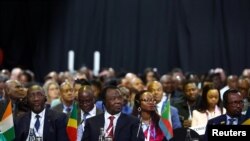Now, ahead of its 2025 expiration, some stakeholders and analysts say the program needs reforms which better align with African progress.
AGOA — first launched in 2000 — grants exports from dozens of eligible African countries duty-free access to the United States. The trade program was renewed in 2015 and has enjoyed long-standing bipartisan support from U.S. lawmakers.
U.S. President Joe Biden has said he supports the reauthorization of AGOA but has called for reforms.
Some African countries are pushing for an early 10-year extension, without changes — a reassurance for business and new investors who might have concerns over AGOA's future.
Johanna LeBlanc, a legal analyst and partner at the Washington-based Adomi Advisory Group, says AGOA needs reforms that reflect "the Africa of today."
"To renew AGOA the way it is right now would not do the African continent any justice. We need to take a step back and ensure that a new AGOA is consistent with the changes on the African continent and also the economies which have evolved drastically across the African continent," LeBlanc told VOA.
South African Trade Minister Ebrahim Patel said at the Johannesburg summit that stakeholders were not "looking for AGOA to be scrapped and a complete rewrite."
"We are looking for refinements," he said.
Under AGOA, beneficiaries must meet rigorous eligibility requirements, including making progress towards establishing a market-based economy, upholding the rule of law and political pluralism, as well as eliminating barriers to U.S. trade and protecting human rights.
Additionally, countries cannot engage in activities that undermine U.S. national security or foreign policy objectives.
Biden plans to strip four African countries — Gabon, Niger, Uganda, and the Central African Republic, CAR — of their AGOA trade benefits, effective January 1, 2024, citing governance and human rights failings.
Dennis Matanda, a U.S.-based trade and investment analyst, told VOA’s Straight Talk Africa AGOA’s "limitations" need to be revisited.
"Taking AGOA out of a country like Uganda or Niger — any of those countries — is devastating, especially because it then makes the governments have to explain it to their people, who will ask, 'What are you doing? Why aren’t you advocating hard enough for us?'"
Matanda says AGOA "is not serving an equitable role across Africa, especially because it allows for cutting countries out over a few disagreements."
'A political game'
Critics argue the removal of countries who fail to meet AGOA’s eligibility requirements only affects ordinary individuals rather than governments.
In June, a bipartisan group of U.S. lawmakers wrote to the Biden administration calling for the punishment of South Africa for its alleged support of Russia amid its conflict with Ukraine. The group called for the relocation of the recently ended AGOA summit to another country.
"We are seriously concerned that hosting the 2023 AGOA Forum in South Africa would serve as an implicit endorsement of South Africa’s damaging support for Russia’s invasion of Ukraine and possible violation of U.S. sanctions law," said the lawmakers' letter.
AGOA is a cornerstone of relations between South Africa and the U.S., and according to the Office of the U.S. Trade Representative, in 2022, the southern African nation exported about $3 billion worth of goods to the U.S. market.
Marissa Lourenço, a Johannesburg-based political risk analyst, says while the U.S. has the prerogative to establish AGOA's eligibility criteria, at times "AGOA effectively becomes a political game."
"At end of the day, AGOA is introduced by the U.S. and African countries are going to have to play by Washington’s rules, and sometimes the U.S. is not going to apply those rules necessarily fairly, because AGOA is a soft power tool. But, it appears politics really means more than anything else," Lourenco said.
Lourenço cautioned that dropping South Africa from the trade pact would be easier said than done, especially if Washington sees AGOA as critical in countering the influence of China in Africa.
"The U.S. would not want to take a step back from South Africa because then that opens the door for other partners to come in and play a much more influential role in Pretoria’s foreign policy, and in the global landscape," Lourenço added.
LeBlanc says the renewal of AGOA aligns with U.S. national security and strategic interests.
"Otherwise, you lose the continent to countries like China, Russia. And, as we know, China is one of Africa's top trading partners, currently. There's a lot at stake right now," she said.
"While there are aspects of AGOA that Congress should seek to improve, we believe the priority should be renewing the program as soon as possible and for a lengthy period," the group said.
Some information in this report came from Reuters.

Forum